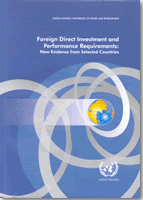
The continuous globalization of the world economy poses new challenges for the governance of economic activities. This is particularly the case in the area of foreigndirect investment. Investment and trade liberalization have provided greater freedom to transnational corporations to organize their production activities across borders in accordance with their own corporate strategies and the competitive advantages of host-countries. Countries today view inward foreign direct investment as an important means of integrating their economies with international markets and expect it to contribute to their economic development. Nonetheless, openness alone is not always sufficient for the expected benefits to materialize. In order to narrow the gap between the objectives of host countries and transnational corporations, governments use a variety of policy measures.
Performance requirements can be an important policy tool in this context, to enhance the benefits of, and address concerns related to, inward FDI. Their role in policy-making is still controversial, however. Many developing countries seekto preserve their right to utilize them, arguing that they should have the right to use tools that were available to developed countries when they were industrializing their economies. Developed countries, on the other hand, tend to associateperformance requirements with interventionist strategies of thepast and question their effectiveness.
In response to a request made by the Commission on Investment, Technology and Related Financial Issues at its sixth session, the present volume is meant to contribute to thedebate on performance requirements by bringing new empirical evidence to bear on the subject. To this end, the volume presents four developing country case studies and areview of the experience of developed countries. The focus of the analysis is on performance requirements that are not prohibited by the WTO Agreement on Trade-RelatedInvestment Measures, but may be addressed in various agreements at the bilateral or regional levels.
Rubens Ricupero
Secretary-General, UNCTAD
Geneva, October 2003


